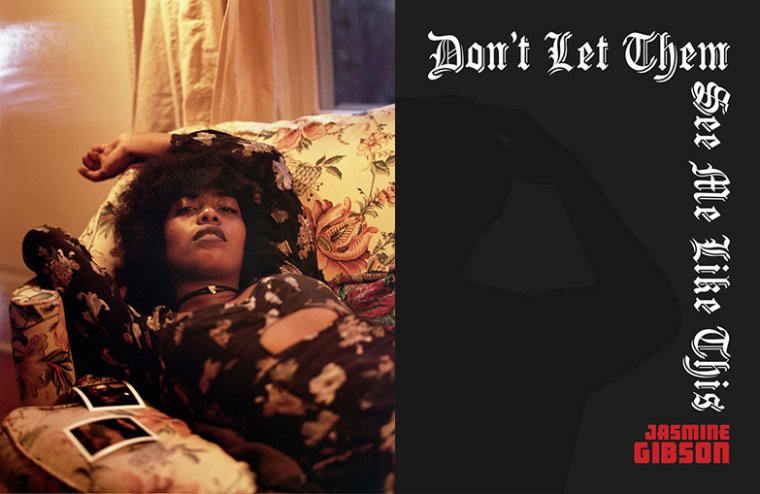This week’s installment of Ten Questions features Jasmine Gibson, whose debut poetry collection, Don’t Let Them See Me Like This, is out this month from Nightboat Books. In poems that inexorably tie the personal to the political, Gibson speaks to the disillusioned in moments of crisis, whether in the aftermath of Hurricane Katrina or in the long, slow echo of the Syrian civial war. “Reading this collection is like listening to love poems on a dock while watching transnational cargo ships on fire and sinking,” writes poet Tonga Eisen-Martin about the collection. “Here there are no gods of private causes. Just words dashing on our behalf, only a breath’s distance in front of the beast.” Gibson is also the author of the chapbook Drapetomania, released by Commune Editions in 2015, and coauthor, with Madison Van Oort, of the chapbook TimeTheft: A Love Story (The Elephants, 2018). Originally from Philadelphia, Gibson lives in Brooklyn, New York.

Jasmine Gibson, author of Don’t Let Them See Me Like This. (Credit: Sean D. Henry-Smith)
1. How long did it take you to write Don’t Let Them See Me Like This?
The book was written over the course of three years. It has changed a lot from what it was originally supposed to be. I thought it would only be two years of work, which is what it was at first. Different things happened, choices made, no love lost, and now it’s a three-year-old maenad waiting to be born.
2. Where, when, and how often do you write?
When I first started writing about five years ago, I would go to this specific bar in Manhattan’s West Village and do a whole ritual. I’d get my paycheck, get a book from St.Mark’s Bookstore, then a banh mi, and then four margaritas in I’d start writing in the darkness of the bar. I did this ritualistically: a specific day, a specific time, a specific bar, alone in the dark. I don’t do this anymore. I like writing in the sun, in bed, in the middle or after kissing. I’m a true Leo, I love love, and writing is like love. It’s painful sometimes, but it really burns you in a way that everyday stuff doesn’t really do. It reminds me of this Bobby Womack quote I saw once: “I live for love. I’ve always been tortured by love. I don’t mind the pain. I want to be the king of pain.” And in a way I, too, love to be the King of Pain, Queen of Ache.
3. What was the most surprising thing about the publication process?
Everyone says time, but babies come when they want to come, that’s what books are like. I’d say the most surprising thing is how the publication process really makes your world smaller and prepares you for postpartum from your book. It gives you a little taste into the way people think about you and your work. It’s really truth telling.
4. Where did you first get published?
I got published first by Commune Editions. They were, at that time, the only people to really dig my work before anyone else.
5. What are you reading right now?
Raquel Salas Rivera’s Lo terciario / The Tertiary, Reek Bell’s A Great Act, and Claude McKay’s A Long Way From Home.
6. Who is the most underrated author, in your opinion?
Authors outside of institutions. That’s where the most interesting work is coming from. With institutions, it’s always this bait-and-switch thing that happens that puts a straight jacket on people’s work.
7. What is the biggest impediment to your writing life?
Myself, sometimes I’m unsure, sometimes I’m hubris. I think when I wrote TimeTheft: A Love Story with Madison Van Oort, I was able to balance out my own thoughts with her level headedness.
8. What is one thing you’d change about the literary community and/or the publishing business?
My most genuine response would be that it was more accessible to voices that are pushed to the margins. But also I think this response gets perverted by the publishing and literary community, which is why you have “special”(fetish) issues to talk about subjects that are just normal ways of living for a lot of people. So, I’d say: more incendiary small presses and zine makers to the front.
9. When you’re not writing, what do you like to do?
I like to hangout with friends, drink, talk to my mom and sister, and go on dates with my partner. I like reading about strange factoids and record shopping.
10. What’s the best piece of writing advice you’ve ever heard?
There is none really, either it’s classicist or unfeasible. I think sincerity is important to the process of writing, because the work really can speak for itself, and no one can pimp that out. So, mine is this: Get in where you fit in, and where you don’t, break it.







